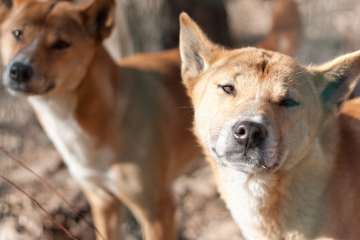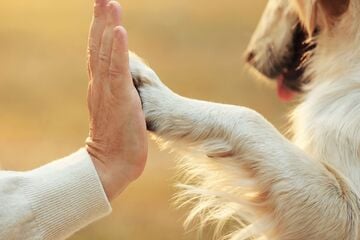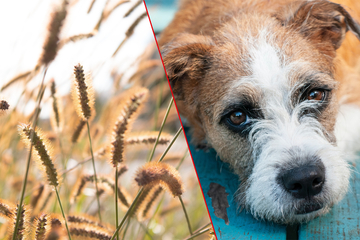Do dogs recognize themselves in the mirror? Are dogs self-aware?
Dogs are known for freaking out in front of the mirror. Are they having a crisis over their appearance, or is something else going on? We take a look at whether dogs recognize themselves in the mirror.
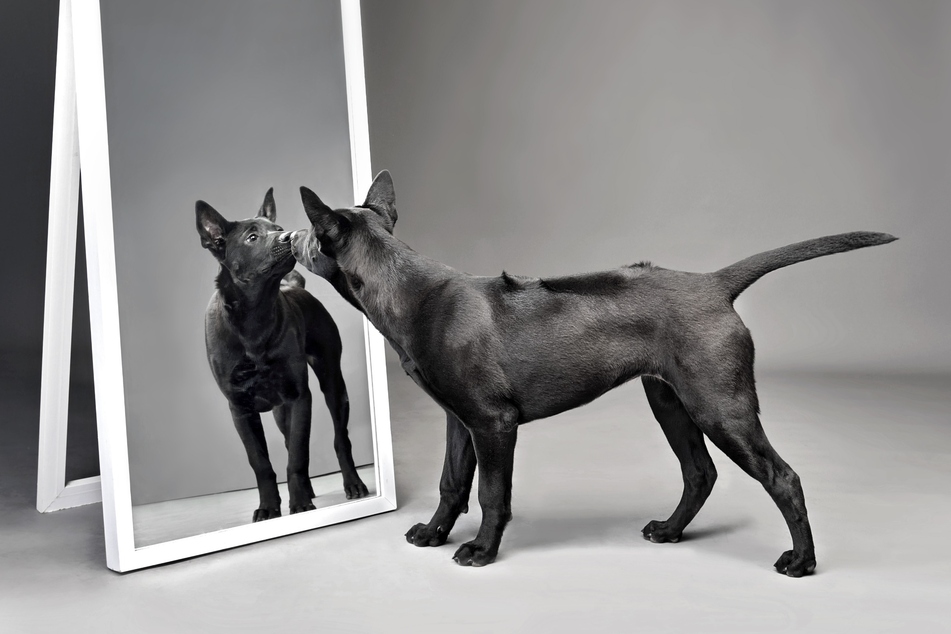
There are few people in this world who haven't been tripped out of their minds by some mirror-induced optical illusion. To dogs, though, these glossy reflective surfaces are even more trippy. After all, who is that doggo in the glass, and why is it copying me?
In this dog guide, TAG24 will take a look at whether dogs recognize themselves in the mirror. Are dogs self-aware? Do they understand their reflection? Let's take a look!
Can dogs see in the mirror?
When a dog looks in a mirror, it'll have a reaction. Some simply stare, turning their heads and nudging the mirror with their noses, confused as to why they can see but not smell another dog. Others get aggressive, or even scared, or might start barking at their reflection.
This confusion will be echoed by almost any dog in the same situation. Let's be real: if there's any word to describe every dog's reaction to a mirror, it would be "confuzzled". So, can they actually see their reflection, they can certainly see something! The facts are quite simple.
Yes, dogs can see in mirrors and will react to that visual stimuli. They are conscious that they are observing a dog, but that doesn't mean that they understand what the reflection actually is.
Can dogs recognize themselves in the mirror? Do dogs understand mirrors?
Self-perception and a sense of self is both a powerful and interesting thing. Mirrors are directly linked to these concepts, as they are literally reflecting an image of yourself that you would never have otherwise seen. To know that it's you, you need to know what "you" are.
The Gallup Mirror Test, also known as the red spot technique, is a behavioral test developed by psychologist Gordon Gallup Jr. in 1970. Used mainly on animals but also on small children, the test allowed scientists to determine at what age people start recognizing their reflections, and which animals share these same traits.
Let's break it down: An animal (or person) is positioned in front of a mirror, in full view of their reflection. A small red dot is drawn on the subject (usually on its forehead), and then they are observed. If the subject has a physical reaction to the dot itself (for example, if the child touches their own forehead instead of pointing at the dot in the reflection), it can be said that the subject has recognized itself in the mirror.
With these tests, we can determine whether a dog can recognize itself in the mirror, in a reflection on the surface of a pond, or even in a photograph. Fascinating, right? So, do dogs understand mirrors?
When subjected to the Gallup Mirror Tests, dogs do not react to the colored dot. As a result, dogs do not recognize themselves in the mirror, nor do they understand mirrors. It all comes back to that word again: They're just confuzzled.
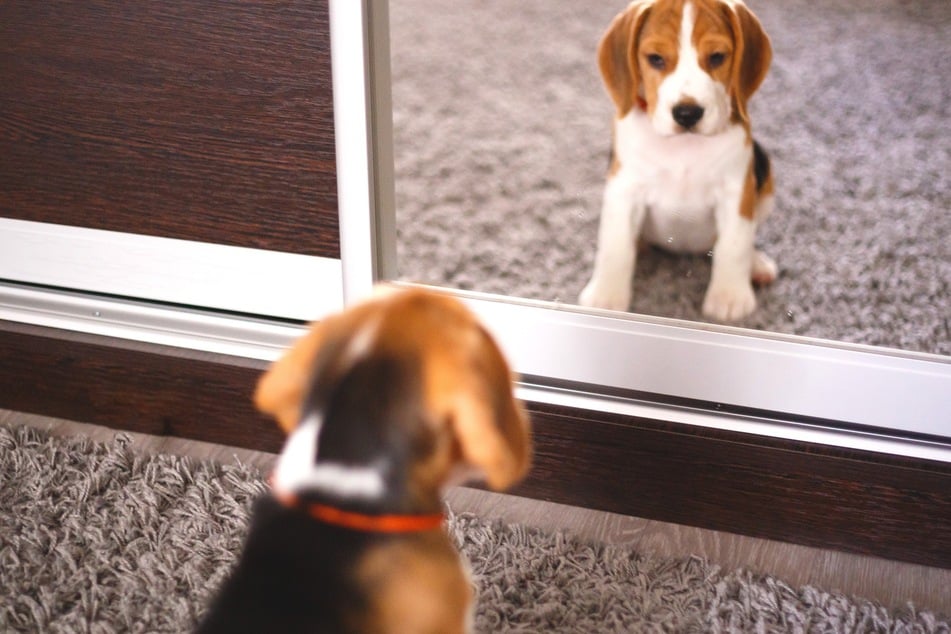
Are dogs self aware?
Just because an animal doesn't recognize itself in the mirror doesn't mean that it isn't self-aware. It just means that its self-awareness has different characteristics than that of a human (or, indeed, any animal that can recognize its reflection).
While our canine companions can't recognize themselves, they can use the mirror to find things. If a dog is stationed in front of a mirror and can see a treat in the mirror, it can then locate that same treat in the real world. This is a characteristic that implies that the dog has reasoning and deliberation skills.
On top of this, dogs display self-awareness in a range of other areas. They can, for example, recognize their own smell and even recall memories. While they don't understand that the dog in the mirror is them, they do also have a sense of bodily awareness.
This was the subject of a study by Rita Lenkei published in Scientific Reports in 2021 and reported on by Earth.com. It was discovered that there was "convincing evidence of body awareness through the understanding of the consequence of own actions in a species where previously no higher-order self-representation capacity was found".
So yes, dogs have bodily awareness, and they have a basic understanding of cause and consequence. On top of being capable of recognizing their smell, it can be determined that dogs do have a certain amount of self-awareness, it's just in a different capacity to a human's sense of self.
Do dogs know what they look like?
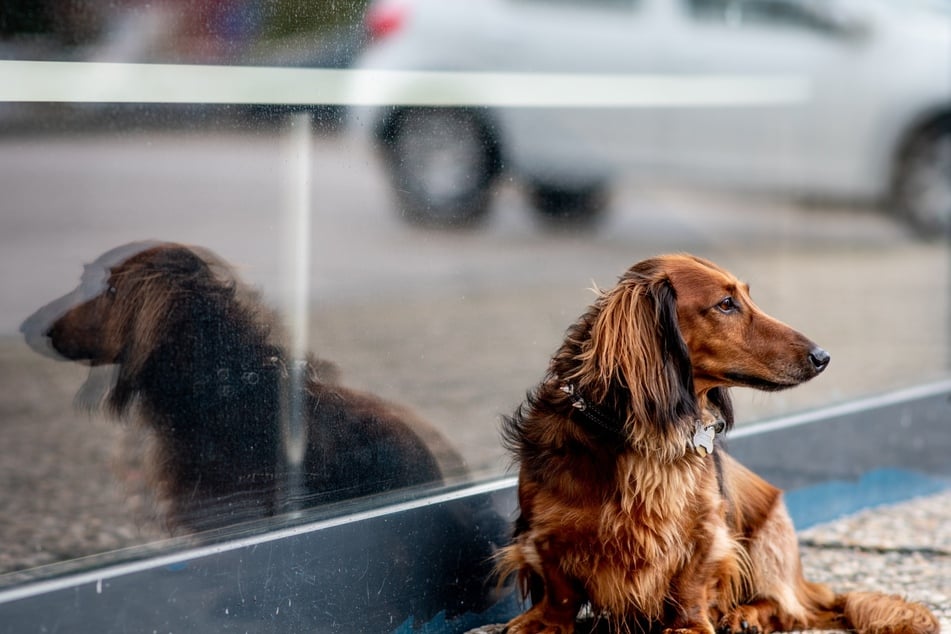
As they don't understand or recognize their own reflection, it can be determined that dogs also don't really have any sense or knowledge of how they look or what they look like. In other words, no, your dog won't get upset if you give it a bad haircut (as long as the haircut doesn't hurt or inconvenience them, of course).
What they can recognize, though, is odors. Your dog will know and recognize its own smell. This will provide comfort and helps them to determine and remember what is there and what isn't, what is safe, and what shouldn't be interacted with.
While they'll also understand the sound of a played-back bark, they won't necessarily recognize it as their own either. We need to remember that dogs are not humans and do not share the same characteristics. They don't know what they sound like, and they also don't know what they look like.
Dogs and mirrors are a fascinating display of consciousness
Many doctors believe that the moment children recognize themselves in the mirror, reacting to the dot spotted upon their head, they have started to develop a true sense of self - a consciousness they didn't have before. Since dogs don't react to such stimuli, interesting questions can be asked whether dogs are truly "conscious" in the way we like to imagine them.
A dog's inability to recognize its reflection is another interesting example of how advanced the human brain has evolved to be. Sure, dogs have a degree of self-recognition, but the "sense of self" we humans have is unparalleled not only in our canine companions but in the rest of the animal kingdom as well.
Cover photo: 123RF/Ealisa

